Effective Nursing Interventions for Dementia Patient Wellbeing
VerifiedAdded on 2023/04/07
|7
|1386
|275
Essay
AI Summary
This essay examines the care of an 81-year-old man, Alf, experiencing late-stage dementia, focusing on nursing interventions to promote his wellbeing and recovery. It explores the signs and symptoms of Alzheimer's disease and emphasizes the importance of person-centered care, including incorporating the patient's lifestyle, culture, and preferences. The essay highlights the significance of family involvement and the Mental Capacity Act 2005 in decision-making. It discusses various nursing interventions such as validation therapy, reminiscence therapy, and pet therapy to address symptoms like wandering, confusion, and incontinence. The essay also emphasizes the role of palliative care and effective communication skills in supporting the patient's emotional and psychological wellbeing. The paper references ICD-10 codes for diagnosis and various research papers to support its arguments, concluding with the importance of training and workshops for nurses to enhance their skills in dementia care.

Running head: DEMENTIA
Name of the Student
Name of the University
Author Note
Name of the Student
Name of the University
Author Note
Paraphrase This Document
Need a fresh take? Get an instant paraphrase of this document with our AI Paraphraser
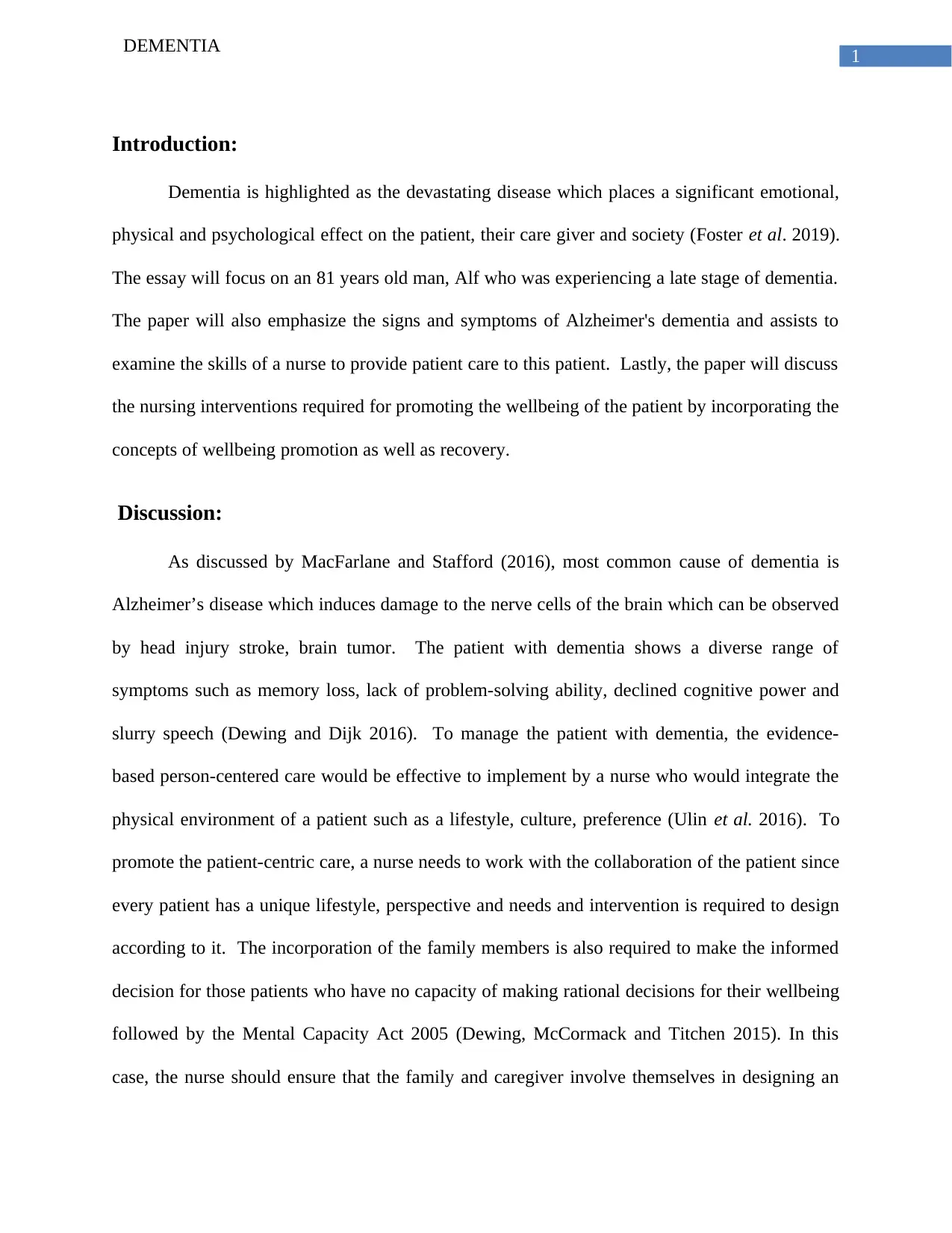
1
DEMENTIA
Introduction:
Dementia is highlighted as the devastating disease which places a significant emotional,
physical and psychological effect on the patient, their care giver and society (Foster et al. 2019).
The essay will focus on an 81 years old man, Alf who was experiencing a late stage of dementia.
The paper will also emphasize the signs and symptoms of Alzheimer's dementia and assists to
examine the skills of a nurse to provide patient care to this patient. Lastly, the paper will discuss
the nursing interventions required for promoting the wellbeing of the patient by incorporating the
concepts of wellbeing promotion as well as recovery.
Discussion:
As discussed by MacFarlane and Stafford (2016), most common cause of dementia is
Alzheimer’s disease which induces damage to the nerve cells of the brain which can be observed
by head injury stroke, brain tumor. The patient with dementia shows a diverse range of
symptoms such as memory loss, lack of problem-solving ability, declined cognitive power and
slurry speech (Dewing and Dijk 2016). To manage the patient with dementia, the evidence-
based person-centered care would be effective to implement by a nurse who would integrate the
physical environment of a patient such as a lifestyle, culture, preference (Ulin et al. 2016). To
promote the patient-centric care, a nurse needs to work with the collaboration of the patient since
every patient has a unique lifestyle, perspective and needs and intervention is required to design
according to it. The incorporation of the family members is also required to make the informed
decision for those patients who have no capacity of making rational decisions for their wellbeing
followed by the Mental Capacity Act 2005 (Dewing, McCormack and Titchen 2015). In this
case, the nurse should ensure that the family and caregiver involve themselves in designing an
DEMENTIA
Introduction:
Dementia is highlighted as the devastating disease which places a significant emotional,
physical and psychological effect on the patient, their care giver and society (Foster et al. 2019).
The essay will focus on an 81 years old man, Alf who was experiencing a late stage of dementia.
The paper will also emphasize the signs and symptoms of Alzheimer's dementia and assists to
examine the skills of a nurse to provide patient care to this patient. Lastly, the paper will discuss
the nursing interventions required for promoting the wellbeing of the patient by incorporating the
concepts of wellbeing promotion as well as recovery.
Discussion:
As discussed by MacFarlane and Stafford (2016), most common cause of dementia is
Alzheimer’s disease which induces damage to the nerve cells of the brain which can be observed
by head injury stroke, brain tumor. The patient with dementia shows a diverse range of
symptoms such as memory loss, lack of problem-solving ability, declined cognitive power and
slurry speech (Dewing and Dijk 2016). To manage the patient with dementia, the evidence-
based person-centered care would be effective to implement by a nurse who would integrate the
physical environment of a patient such as a lifestyle, culture, preference (Ulin et al. 2016). To
promote the patient-centric care, a nurse needs to work with the collaboration of the patient since
every patient has a unique lifestyle, perspective and needs and intervention is required to design
according to it. The incorporation of the family members is also required to make the informed
decision for those patients who have no capacity of making rational decisions for their wellbeing
followed by the Mental Capacity Act 2005 (Dewing, McCormack and Titchen 2015). In this
case, the nurse should ensure that the family and caregiver involve themselves in designing an
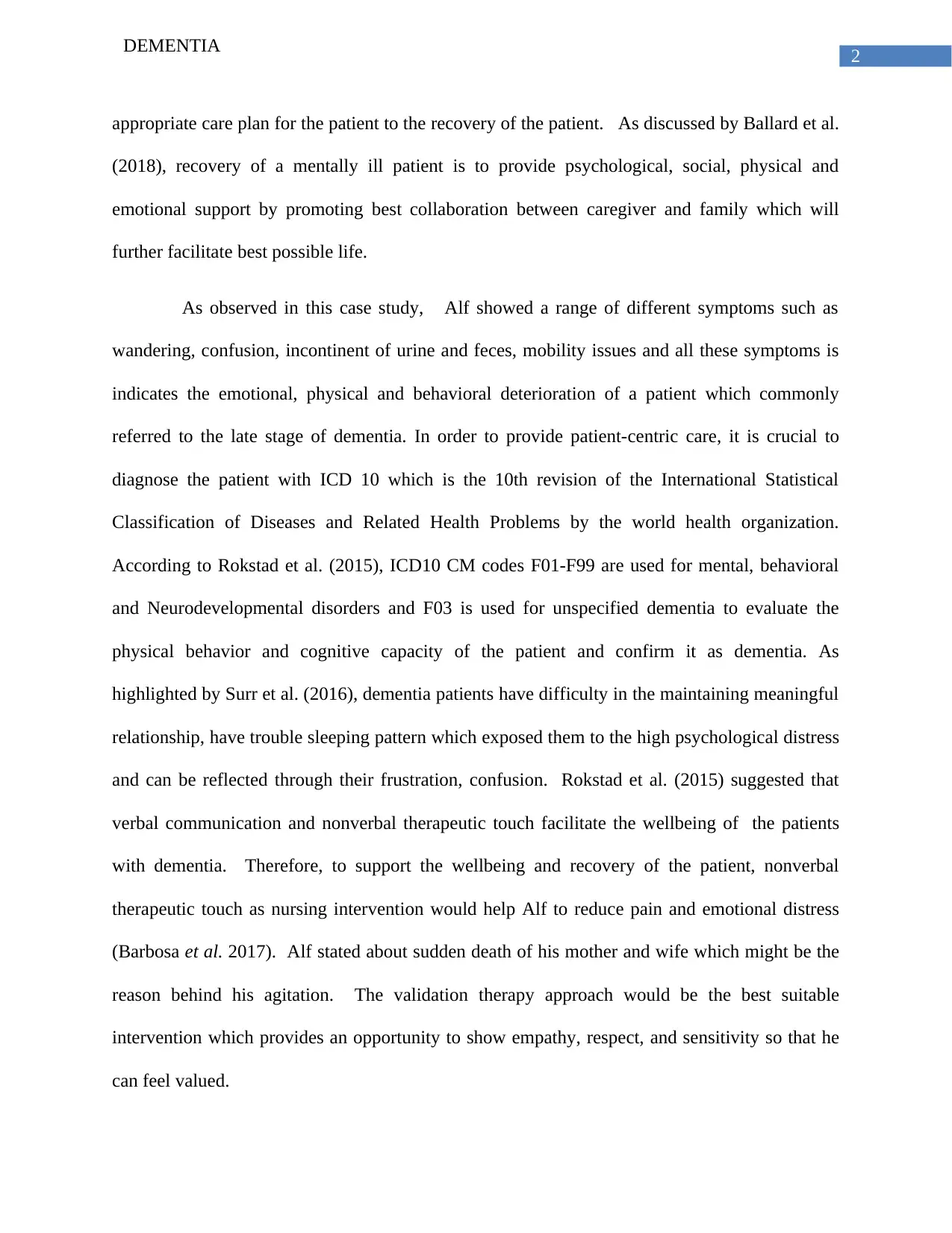
2
DEMENTIA
appropriate care plan for the patient to the recovery of the patient. As discussed by Ballard et al.
(2018), recovery of a mentally ill patient is to provide psychological, social, physical and
emotional support by promoting best collaboration between caregiver and family which will
further facilitate best possible life.
As observed in this case study, Alf showed a range of different symptoms such as
wandering, confusion, incontinent of urine and feces, mobility issues and all these symptoms is
indicates the emotional, physical and behavioral deterioration of a patient which commonly
referred to the late stage of dementia. In order to provide patient-centric care, it is crucial to
diagnose the patient with ICD 10 which is the 10th revision of the International Statistical
Classification of Diseases and Related Health Problems by the world health organization.
According to Rokstad et al. (2015), ICD10 CM codes F01-F99 are used for mental, behavioral
and Neurodevelopmental disorders and F03 is used for unspecified dementia to evaluate the
physical behavior and cognitive capacity of the patient and confirm it as dementia. As
highlighted by Surr et al. (2016), dementia patients have difficulty in the maintaining meaningful
relationship, have trouble sleeping pattern which exposed them to the high psychological distress
and can be reflected through their frustration, confusion. Rokstad et al. (2015) suggested that
verbal communication and nonverbal therapeutic touch facilitate the wellbeing of the patients
with dementia. Therefore, to support the wellbeing and recovery of the patient, nonverbal
therapeutic touch as nursing intervention would help Alf to reduce pain and emotional distress
(Barbosa et al. 2017). Alf stated about sudden death of his mother and wife which might be the
reason behind his agitation. The validation therapy approach would be the best suitable
intervention which provides an opportunity to show empathy, respect, and sensitivity so that he
can feel valued.
DEMENTIA
appropriate care plan for the patient to the recovery of the patient. As discussed by Ballard et al.
(2018), recovery of a mentally ill patient is to provide psychological, social, physical and
emotional support by promoting best collaboration between caregiver and family which will
further facilitate best possible life.
As observed in this case study, Alf showed a range of different symptoms such as
wandering, confusion, incontinent of urine and feces, mobility issues and all these symptoms is
indicates the emotional, physical and behavioral deterioration of a patient which commonly
referred to the late stage of dementia. In order to provide patient-centric care, it is crucial to
diagnose the patient with ICD 10 which is the 10th revision of the International Statistical
Classification of Diseases and Related Health Problems by the world health organization.
According to Rokstad et al. (2015), ICD10 CM codes F01-F99 are used for mental, behavioral
and Neurodevelopmental disorders and F03 is used for unspecified dementia to evaluate the
physical behavior and cognitive capacity of the patient and confirm it as dementia. As
highlighted by Surr et al. (2016), dementia patients have difficulty in the maintaining meaningful
relationship, have trouble sleeping pattern which exposed them to the high psychological distress
and can be reflected through their frustration, confusion. Rokstad et al. (2015) suggested that
verbal communication and nonverbal therapeutic touch facilitate the wellbeing of the patients
with dementia. Therefore, to support the wellbeing and recovery of the patient, nonverbal
therapeutic touch as nursing intervention would help Alf to reduce pain and emotional distress
(Barbosa et al. 2017). Alf stated about sudden death of his mother and wife which might be the
reason behind his agitation. The validation therapy approach would be the best suitable
intervention which provides an opportunity to show empathy, respect, and sensitivity so that he
can feel valued.
⊘ This is a preview!⊘
Do you want full access?
Subscribe today to unlock all pages.

Trusted by 1+ million students worldwide
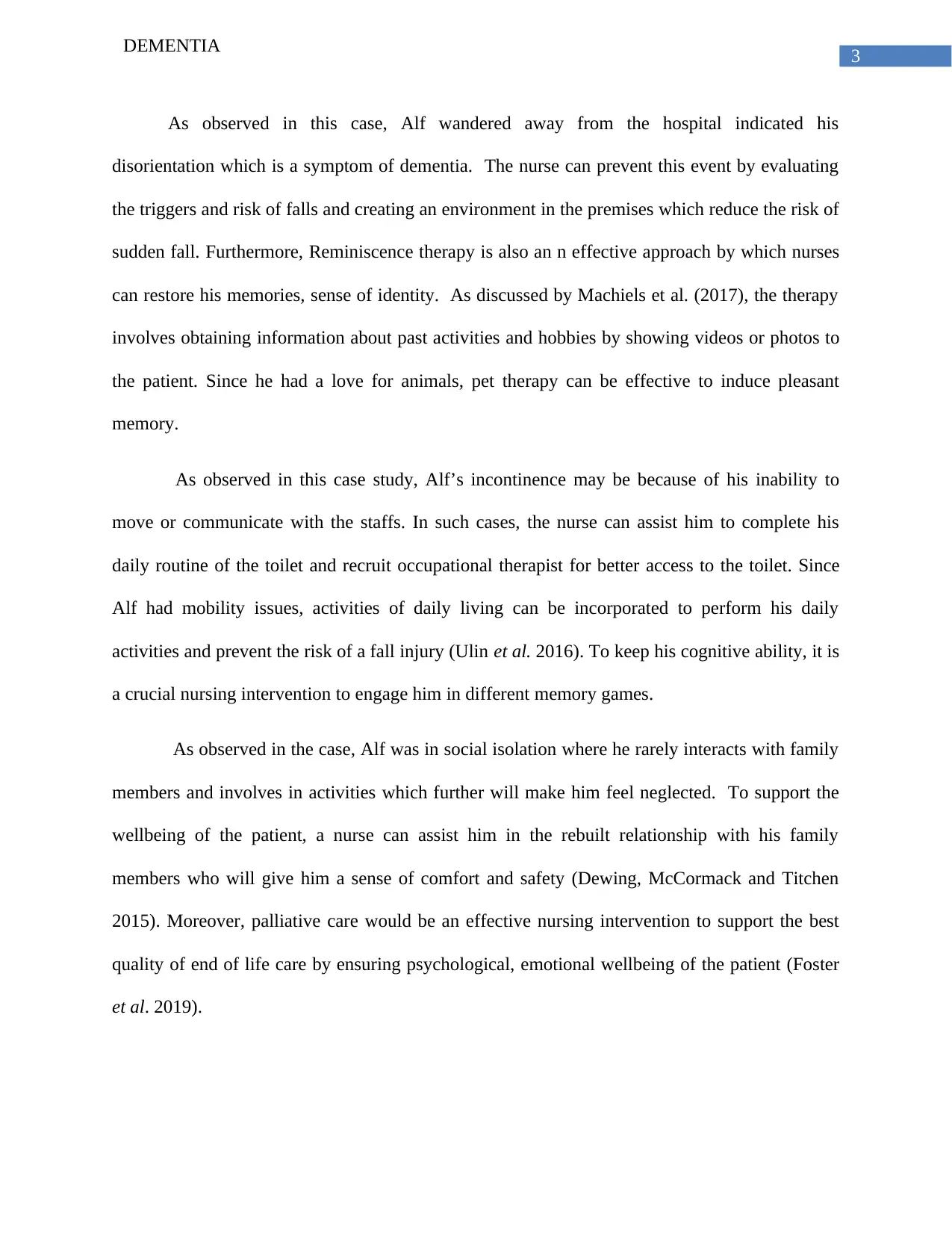
3
DEMENTIA
As observed in this case, Alf wandered away from the hospital indicated his
disorientation which is a symptom of dementia. The nurse can prevent this event by evaluating
the triggers and risk of falls and creating an environment in the premises which reduce the risk of
sudden fall. Furthermore, Reminiscence therapy is also an n effective approach by which nurses
can restore his memories, sense of identity. As discussed by Machiels et al. (2017), the therapy
involves obtaining information about past activities and hobbies by showing videos or photos to
the patient. Since he had a love for animals, pet therapy can be effective to induce pleasant
memory.
As observed in this case study, Alf’s incontinence may be because of his inability to
move or communicate with the staffs. In such cases, the nurse can assist him to complete his
daily routine of the toilet and recruit occupational therapist for better access to the toilet. Since
Alf had mobility issues, activities of daily living can be incorporated to perform his daily
activities and prevent the risk of a fall injury (Ulin et al. 2016). To keep his cognitive ability, it is
a crucial nursing intervention to engage him in different memory games.
As observed in the case, Alf was in social isolation where he rarely interacts with family
members and involves in activities which further will make him feel neglected. To support the
wellbeing of the patient, a nurse can assist him in the rebuilt relationship with his family
members who will give him a sense of comfort and safety (Dewing, McCormack and Titchen
2015). Moreover, palliative care would be an effective nursing intervention to support the best
quality of end of life care by ensuring psychological, emotional wellbeing of the patient (Foster
et al. 2019).
DEMENTIA
As observed in this case, Alf wandered away from the hospital indicated his
disorientation which is a symptom of dementia. The nurse can prevent this event by evaluating
the triggers and risk of falls and creating an environment in the premises which reduce the risk of
sudden fall. Furthermore, Reminiscence therapy is also an n effective approach by which nurses
can restore his memories, sense of identity. As discussed by Machiels et al. (2017), the therapy
involves obtaining information about past activities and hobbies by showing videos or photos to
the patient. Since he had a love for animals, pet therapy can be effective to induce pleasant
memory.
As observed in this case study, Alf’s incontinence may be because of his inability to
move or communicate with the staffs. In such cases, the nurse can assist him to complete his
daily routine of the toilet and recruit occupational therapist for better access to the toilet. Since
Alf had mobility issues, activities of daily living can be incorporated to perform his daily
activities and prevent the risk of a fall injury (Ulin et al. 2016). To keep his cognitive ability, it is
a crucial nursing intervention to engage him in different memory games.
As observed in the case, Alf was in social isolation where he rarely interacts with family
members and involves in activities which further will make him feel neglected. To support the
wellbeing of the patient, a nurse can assist him in the rebuilt relationship with his family
members who will give him a sense of comfort and safety (Dewing, McCormack and Titchen
2015). Moreover, palliative care would be an effective nursing intervention to support the best
quality of end of life care by ensuring psychological, emotional wellbeing of the patient (Foster
et al. 2019).
Paraphrase This Document
Need a fresh take? Get an instant paraphrase of this document with our AI Paraphraser
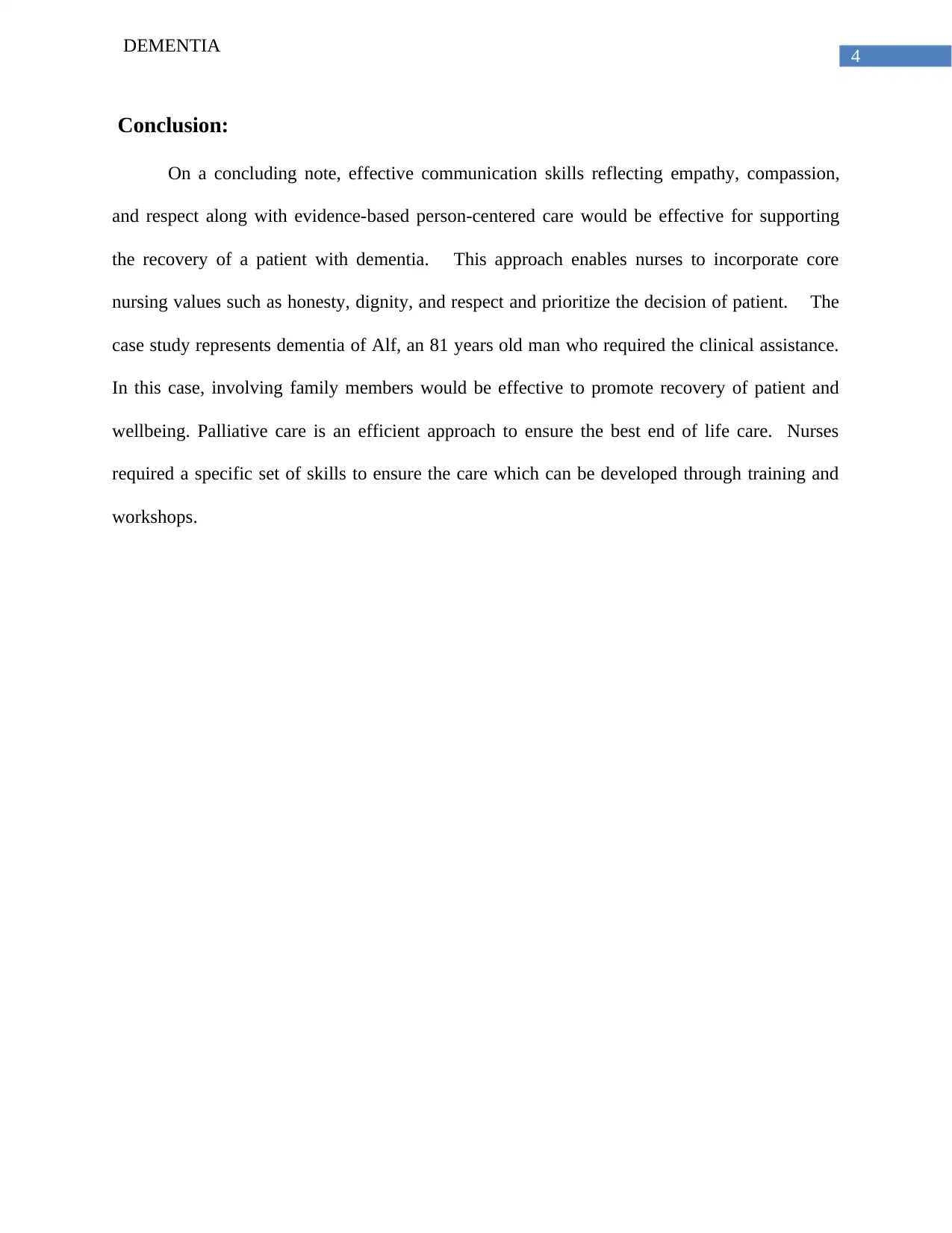
4
DEMENTIA
Conclusion:
On a concluding note, effective communication skills reflecting empathy, compassion,
and respect along with evidence-based person-centered care would be effective for supporting
the recovery of a patient with dementia. This approach enables nurses to incorporate core
nursing values such as honesty, dignity, and respect and prioritize the decision of patient. The
case study represents dementia of Alf, an 81 years old man who required the clinical assistance.
In this case, involving family members would be effective to promote recovery of patient and
wellbeing. Palliative care is an efficient approach to ensure the best end of life care. Nurses
required a specific set of skills to ensure the care which can be developed through training and
workshops.
DEMENTIA
Conclusion:
On a concluding note, effective communication skills reflecting empathy, compassion,
and respect along with evidence-based person-centered care would be effective for supporting
the recovery of a patient with dementia. This approach enables nurses to incorporate core
nursing values such as honesty, dignity, and respect and prioritize the decision of patient. The
case study represents dementia of Alf, an 81 years old man who required the clinical assistance.
In this case, involving family members would be effective to promote recovery of patient and
wellbeing. Palliative care is an efficient approach to ensure the best end of life care. Nurses
required a specific set of skills to ensure the care which can be developed through training and
workshops.
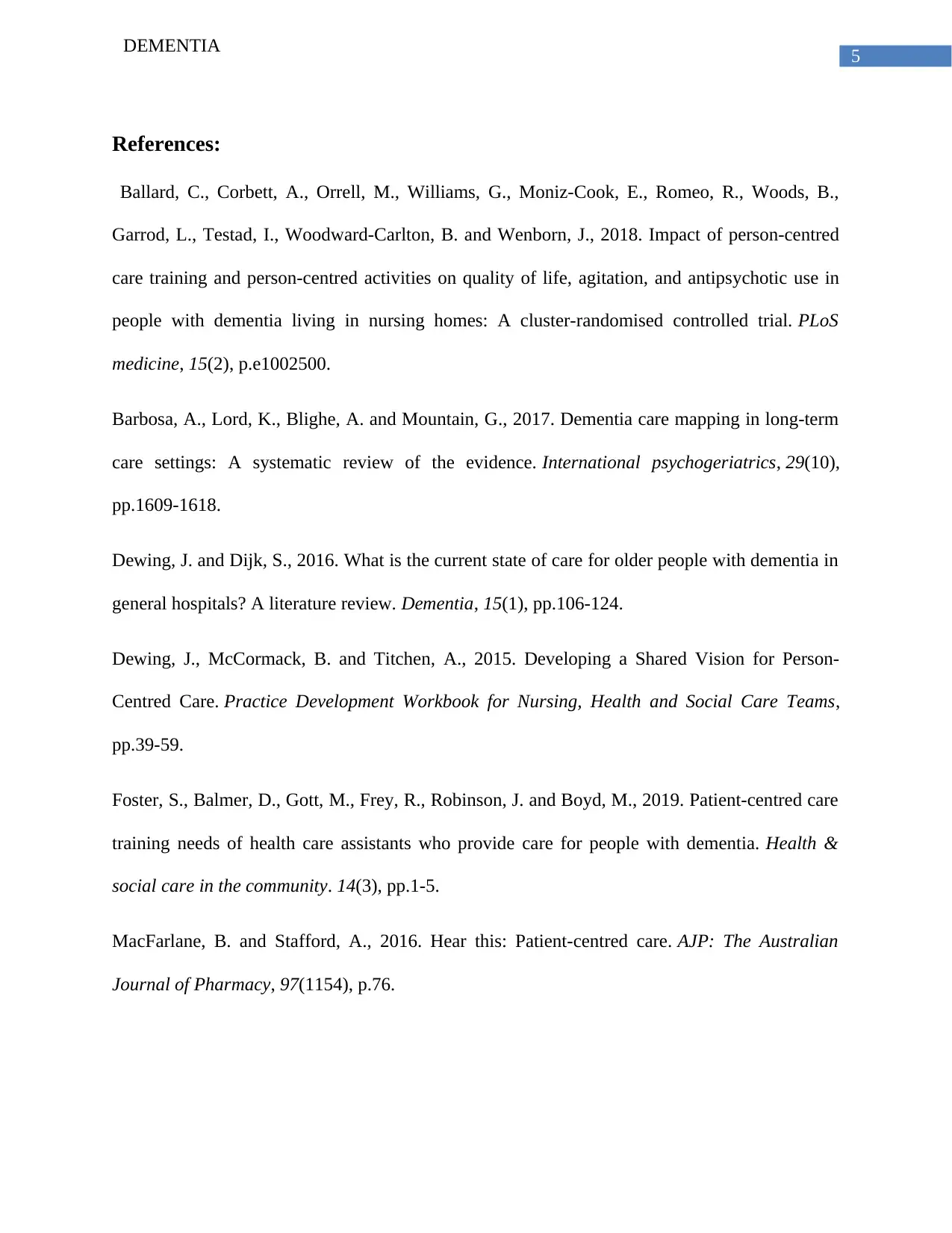
5
DEMENTIA
References:
Ballard, C., Corbett, A., Orrell, M., Williams, G., Moniz-Cook, E., Romeo, R., Woods, B.,
Garrod, L., Testad, I., Woodward-Carlton, B. and Wenborn, J., 2018. Impact of person-centred
care training and person-centred activities on quality of life, agitation, and antipsychotic use in
people with dementia living in nursing homes: A cluster-randomised controlled trial. PLoS
medicine, 15(2), p.e1002500.
Barbosa, A., Lord, K., Blighe, A. and Mountain, G., 2017. Dementia care mapping in long-term
care settings: A systematic review of the evidence. International psychogeriatrics, 29(10),
pp.1609-1618.
Dewing, J. and Dijk, S., 2016. What is the current state of care for older people with dementia in
general hospitals? A literature review. Dementia, 15(1), pp.106-124.
Dewing, J., McCormack, B. and Titchen, A., 2015. Developing a Shared Vision for Person‐
Centred Care. Practice Development Workbook for Nursing, Health and Social Care Teams,
pp.39-59.
Foster, S., Balmer, D., Gott, M., Frey, R., Robinson, J. and Boyd, M., 2019. Patient‐centred care
training needs of health care assistants who provide care for people with dementia. Health &
social care in the community. 14(3), pp.1-5.
MacFarlane, B. and Stafford, A., 2016. Hear this: Patient-centred care. AJP: The Australian
Journal of Pharmacy, 97(1154), p.76.
DEMENTIA
References:
Ballard, C., Corbett, A., Orrell, M., Williams, G., Moniz-Cook, E., Romeo, R., Woods, B.,
Garrod, L., Testad, I., Woodward-Carlton, B. and Wenborn, J., 2018. Impact of person-centred
care training and person-centred activities on quality of life, agitation, and antipsychotic use in
people with dementia living in nursing homes: A cluster-randomised controlled trial. PLoS
medicine, 15(2), p.e1002500.
Barbosa, A., Lord, K., Blighe, A. and Mountain, G., 2017. Dementia care mapping in long-term
care settings: A systematic review of the evidence. International psychogeriatrics, 29(10),
pp.1609-1618.
Dewing, J. and Dijk, S., 2016. What is the current state of care for older people with dementia in
general hospitals? A literature review. Dementia, 15(1), pp.106-124.
Dewing, J., McCormack, B. and Titchen, A., 2015. Developing a Shared Vision for Person‐
Centred Care. Practice Development Workbook for Nursing, Health and Social Care Teams,
pp.39-59.
Foster, S., Balmer, D., Gott, M., Frey, R., Robinson, J. and Boyd, M., 2019. Patient‐centred care
training needs of health care assistants who provide care for people with dementia. Health &
social care in the community. 14(3), pp.1-5.
MacFarlane, B. and Stafford, A., 2016. Hear this: Patient-centred care. AJP: The Australian
Journal of Pharmacy, 97(1154), p.76.
⊘ This is a preview!⊘
Do you want full access?
Subscribe today to unlock all pages.

Trusted by 1+ million students worldwide
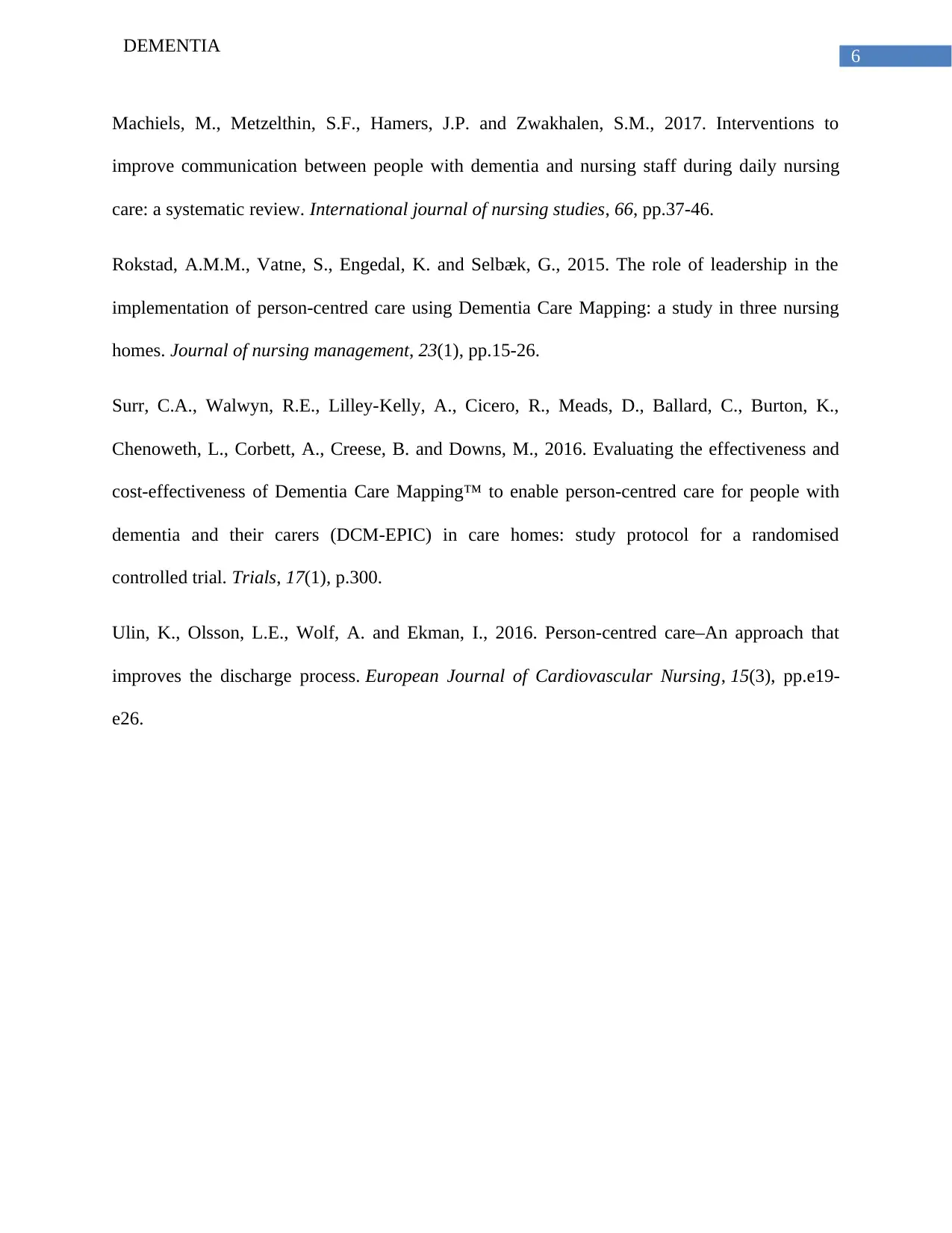
6
DEMENTIA
Machiels, M., Metzelthin, S.F., Hamers, J.P. and Zwakhalen, S.M., 2017. Interventions to
improve communication between people with dementia and nursing staff during daily nursing
care: a systematic review. International journal of nursing studies, 66, pp.37-46.
Rokstad, A.M.M., Vatne, S., Engedal, K. and Selbæk, G., 2015. The role of leadership in the
implementation of person‐centred care using Dementia Care Mapping: a study in three nursing
homes. Journal of nursing management, 23(1), pp.15-26.
Surr, C.A., Walwyn, R.E., Lilley-Kelly, A., Cicero, R., Meads, D., Ballard, C., Burton, K.,
Chenoweth, L., Corbett, A., Creese, B. and Downs, M., 2016. Evaluating the effectiveness and
cost-effectiveness of Dementia Care Mapping™ to enable person-centred care for people with
dementia and their carers (DCM-EPIC) in care homes: study protocol for a randomised
controlled trial. Trials, 17(1), p.300.
Ulin, K., Olsson, L.E., Wolf, A. and Ekman, I., 2016. Person-centred care–An approach that
improves the discharge process. European Journal of Cardiovascular Nursing, 15(3), pp.e19-
e26.
DEMENTIA
Machiels, M., Metzelthin, S.F., Hamers, J.P. and Zwakhalen, S.M., 2017. Interventions to
improve communication between people with dementia and nursing staff during daily nursing
care: a systematic review. International journal of nursing studies, 66, pp.37-46.
Rokstad, A.M.M., Vatne, S., Engedal, K. and Selbæk, G., 2015. The role of leadership in the
implementation of person‐centred care using Dementia Care Mapping: a study in three nursing
homes. Journal of nursing management, 23(1), pp.15-26.
Surr, C.A., Walwyn, R.E., Lilley-Kelly, A., Cicero, R., Meads, D., Ballard, C., Burton, K.,
Chenoweth, L., Corbett, A., Creese, B. and Downs, M., 2016. Evaluating the effectiveness and
cost-effectiveness of Dementia Care Mapping™ to enable person-centred care for people with
dementia and their carers (DCM-EPIC) in care homes: study protocol for a randomised
controlled trial. Trials, 17(1), p.300.
Ulin, K., Olsson, L.E., Wolf, A. and Ekman, I., 2016. Person-centred care–An approach that
improves the discharge process. European Journal of Cardiovascular Nursing, 15(3), pp.e19-
e26.
1 out of 7
Related Documents
Your All-in-One AI-Powered Toolkit for Academic Success.
+13062052269
info@desklib.com
Available 24*7 on WhatsApp / Email
![[object Object]](/_next/static/media/star-bottom.7253800d.svg)
Unlock your academic potential
Copyright © 2020–2026 A2Z Services. All Rights Reserved. Developed and managed by ZUCOL.





